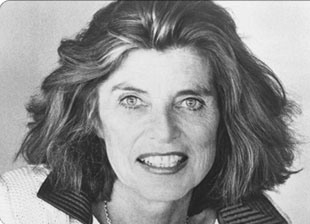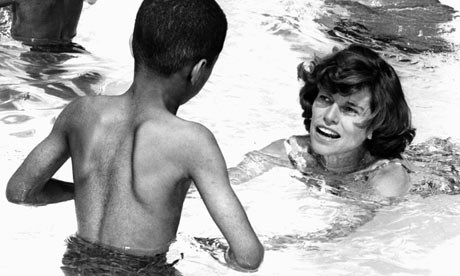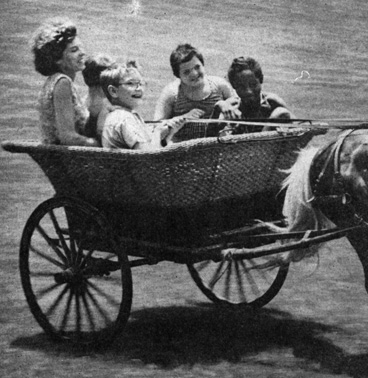“In a world where poverty, war, and oppression have dimmed people’s hopes, Special Olympic athletes rekindle that hope with their spiritual strength, their excellence, and achievements. For as we hope for the best in them, hope is reborn in us,” said Shriver (“Shriver, Eunice Kennedy (1920- ).” Encyclopedia of World Biography). Eunice Kennedy Shriver pioneered the movement to reform the world’s view of the mentally and physically challenged. She inspired humanity by instigating hope throughout the planet during a depression in our country after the end of World War I. Through her personal sacrifice, dedication, and giving nature towards people with disabilities, Eunice Kennedy Shriver taught the world the realities of the disabled community. She earned her title as a hero and a true inspiration by transforming millions of lives who, without her contributions, would face a life full of disregard and rejection.
 |
| Eunice Kennedy Shriver (http://www.womensconference.org/assets/Uploads/MinervaimageTop0013shriver2.jpg) |
Born on July 10, 1921 into the Kennedy family, Shriver grew up in Brookline, Massachusetts. During an interview with Oprah, Maria Shriver, her daughter, explained life growing up in the Kennedy family. Oprah commented about the Kennedy’s lifestyle, “In your new book, you say that the constant doing wasn't just the way you were brought up; it was the doctrine of your life.” Maria replied, “Correct. You must do, and do big. You must change the world. And you must do this 24/7” (“Oprah Talks to Maria Shriver”). Eunice Kennedy Shriver’s upbringing in the Kennedy family initiated her passion to revolutionize the world. She married Sergeant Robert Shriver in 1953, and they gave birth to five children. Two of their children followed in their mother’s footsteps and became advocates for people with special needs. Her sister, Rosemary was born with mild mental retardation. Shriver explained in a news conference in October 1961 that throughout her childhood, “there was practically no effective program in the field of mental retardation. Whenever possible, the children were committed to institutions. They were segregated from normal society and forgotten, except by members of their family… They suffered from lack of public understanding and they suffered from lack of funds” (“Shriver, Eunice Kennedy (1920- ).” Encyclopedia of World Biography). Shriver realized that she held the responsibility to make a drastic change when she saw the dire conditions that Rosemary and the rest of the disabled community suffered.
 |
| Shriver helping a child swim (http://static.guim.co.uk/sys-images/Guardian/Pix/pictures/2009/8/11/1250000914730/Eunice-Kennedy-Shriver-001.jpg) |
Shriver sacrificed so much of her time and used her devoted, benevolent persona to improve the lives for handicapped people. For example, every summer for five weeks, Shriver and her husband dedicated their time to Camp Shriver. Camp Shriver, a summer day camp created by the couple in June 1963, took place at their home in Rockville Maryland (“Shriver, Eunice Kennedy (1920- ).” Encyclopedia of World Biography). At the camp, special needs children participated in many classic sports and outdoor activities. By giving up so much of her time yearly, she demonstrated her passion for treating these unfortunate people equally and helping them lead “normal” lives. Her commitment to Camp Shriver illustrated her dedicated character, which reveals how she touched hundreds of lives. Camp Shriver’s success inspired Shriver to create and support other organizations with the same goal: to allow the mentally and physically impaired to live with acceptance from society. Additionally, in 1962 she founded the Joseph P. Kennedy Jr. Awards in Mental Retardation and the National Institutes for Child Health and Human Development. From 1963 to 1968, the foundation supplied grants to more than eighty organizations similar to Camp Shriver. They gave the most important and influential grant in January of 1968 to the District for an event held in a park in Chicago (“Shriver, Eunice Kennedy (1920- ).” Encyclopedia of World Biography). The event was the first Special Olympics, which today is a world-wide competition that gives disabled athletes an opportunity to participate in a wide variety of Olympic sports. Shriver served as president of this organization for twenty years (“Shriver, Eunice Kennedy (1921- ).” Dictionary of Women Worldwide). Her achievements as president allowed more than one million athletes from fifty U.S. states and 150 countries to compete in 26 sports, and more than 15,000 events during the year of 1999 (“Shriver, Eunice Kennedy (1920- ).” Encyclopedia of World Biography). Shriver’s hard-work for one organization resulted in a revolution to an entire planet. Her zeal and benevolence formed a whole new world for people with intellectual and physical challenges. Loretta Claiborne, a previous Special Olympic track star, explained why Shriver is her hero: “I started out in Special Olympics in 1970, when I was in high school. I’ve seen not only what she’s done for me, but she made the sacrifice for others. The true spirit in life is to be wanted, to have a chance and she’s done that through sports with Special Olympics…that’s all that she wanted to do—to say that every child, no matter who they are, no matter how fast they can learn, no matter how slow they can learn… have the right and the joy to be able to experience life…and one day say, ‘I know I can.’ Not ‘I think I can,’ but ‘I know I can’” (Crockett). Claiborne deems Shriver a hero because of the significant amount of time she sacrificed to the Special Olympics and because of the lessons that she instilled in the world.
 |
| Eunice Kennedy Shriver (http://www.saturdayeveningpost.com/wp-content/uploads/satevepost/photo_20090815_eunice_kennedy_shriver_children.jpg) |
Shriver taught the world how to treat the disabled equally, and she showed us how to face and prevail over our adversities through these people. In November 2007 Eunice Kennedy Shriver spoke at the JFK Library and Museum and explained, “My life is about being lucky as a child. To be raised by parents who loved me and made me believe in possibilities - but in a strange way, perhaps my life also includes being lucky in the adversity I encountered. I am lucky that I experienced the sting of rejections as a woman who was told that the real power was not for me. I am lucky that I saw my mother and my sister Rosemary treated with unbearable rejection. I am lucky that I have had to confront political and social injustice around the world throughout my career. You might say, 'why are we lucky to have such difficult experiences?' The answer is simple: the combination of the love of my family and the awful sting of rejection helped me to develop the confidence that I needed to believe that I could make a difference in a positive direction” (Crockett). Her challenges in life helped her recognize anybody, no matter what ability or disability, can triumph over his or her obstacles. She demonstrated that challenges do not hold us back, but rather they propel us forward in life and aid us in becoming stronger people (Crockett). She and her son, Tim, promote this belief through Special Olympics. Tim once told Oprah Winfrey, “Special Olympics is about…saying it’s not what you’re born with but what you bring to the table. If you run that race with everything God gave you, you’ve won” (“Shriver, Eunice Kennedy (1920- ).” Encyclopedia of World Biography). Likewise, Shriver also expressed the important life lesson that everyone is created equally when she stated, “…all human beings are created equal in the sense that each has the capacity and a hunger for moral excellence, for courage, for friendship and for love. Whatever the speed of our feet or the power of our arms, each of us is capable of these highest virtues. Intelligence does not limit love, nor does wealth produce friendship” (Crockett). Shriver proved to the entire world that the capabilities of a person are not restricted by knowledge or by how well his or her body works. The ability of a person measures our perseverance, bravery, kindness, and compassion for others. Because of Shriver, we treasure these valuable life lessons and strive to adhere to them.
We consider Eunice Kennedy Shriver a true inspiration because she showed the world that one person can leave an everlasting impact on millions of lives. Her effort compelled many countries to change their laws and views of this underprivileged group. “Ireland rewrote its anti-discrimination statutes after the Special Olympics were held in Dublin in 2003…Three decades ago Russia claimed that it had no citizens with intellectual disabilities-it sent a team of 190 to Shanghai… People who were once locked in dark rooms now kick soccer balls in the light of day” in Iraq and Afghanistan (McCallum). In the United States, Shriver and the Special Olympics influenced the Education for All Handicapped Children Act in 1975 and the Americans with Disabilities Act in 1990 (McCallum). Because of Shriver’s hard work and influence, she affected a multitude of disabled people around the globe. Her commitment and time sacrificed to benefit a group of people who society did not tolerate, is admirable and inspiring. We consider her an accomplished hero because of all of the change she produced throughout the world. As one Chinese mother of an athlete participating in the Special Olympics conveyed it, “Mrs. Shriver is our hero because she brought happiness and freedom to people with intellectual disabilities around the world, especially in China, so that they will have self-confidence and happiness through participating in sports” (Crockett). Although Shriver passed away in August of 2009, her presence will always be felt because of the impact she bestowed on the disabled community and the entire world.
Page created on 5/17/2010 1:14:46 PM
Last edited 8/20/2018 4:48:32 AM
